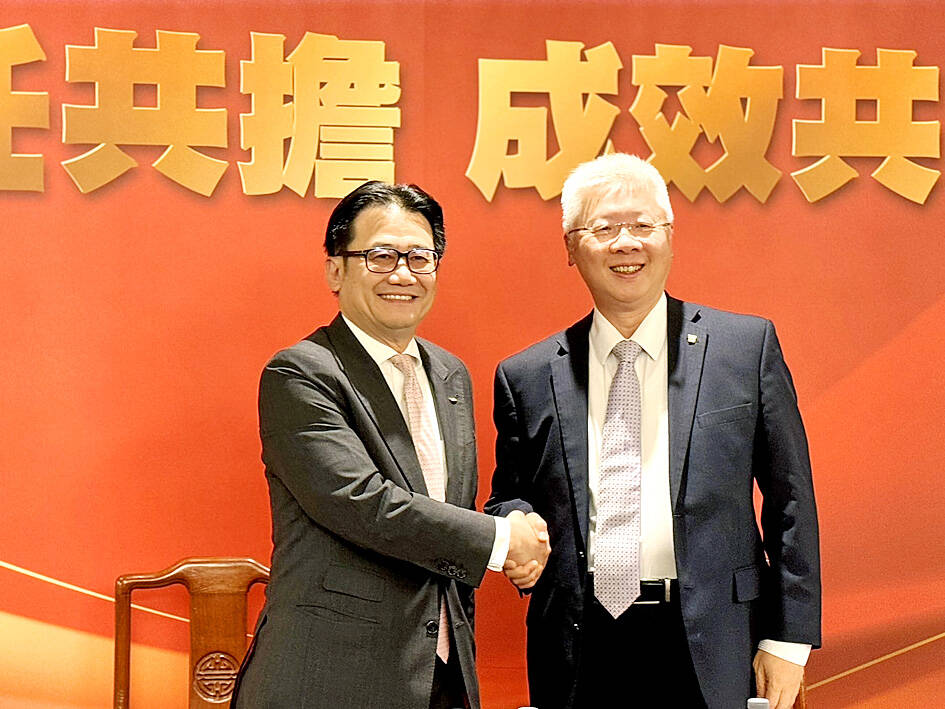Taishin Financial Holding Co (台新金控) and Shin Kong Financial Co (新光金控) yesterday jointly said they were confident their proposed merger would win approvals at their respective shareholders’ meetings tomorrow, ushering in a new era for both entities.
Taishin Financial president Welch Lin (林維俊) and Shin Kong Financial president Stephen Chen (陳恩光) made the announcement during a media briefing in Taipei.
Foreign institutional investors would largely support the merger and more than 70 percent would take part in the shareholders’ meetings to show their support, Lin said.

Photo: Kelson Wang, Taipei Times
“The turnout this time would surpass my expectation,” said Lin, who recently finished roadshows to drum up support for the merger.
Foreign institutional investors placed great importance on the merger plan, which would create substantial synergies for life insurance-oriented Shin Kong Financial and bank-focused Taishin Financial, Lin said.
The two companies would hold their respective shareholders’ meetings tomorrow and would file the merger application with the Financial Supervisory Commission on Friday, Lin said.
Taishin Financial has proposed to carry out the merger through share swap arrangements, where one Shin Kong share would be traded for 0.672 Taishin Financial common shares and 0.175 Taishin Financial preferred shares.
The preferred shares would receive an annual interest rate of 1.665 percent before their buyback three years later.
The scheme would suggest a merger price of NT$14.18 (US$0.44) per share, or a 17.67 percent premium based on Shin Kong’s closing price of NT$12.05 on the main board yesterday.
Taishin Financial would be the surviving entity, Shin Kong Financial would be delisted and the new conglomerate would be named Tashin Shin Kong Financial Holding Co (台新新光金控), Lin said, adding that it would become Taiwan’s fourth-largest financial conglomerate based on assets.
The merger would bolster bilateral life insurance and banking businesses, and shore up bilateral securities operations, he said.
Taishin Financial would address the commission’s concern over the capital strength of Shin Kong Life Insurance Co (新光人壽), the main subsidiary of Shin Kong Financial, Lin said.
As of June 30, Taishin Financial has a capital adequacy ratio of 120 percent and double-leverage ratio of 113 percent, and is ready for capital increases to support Shin Kong Life if necessary, he said.
The readings at Shin Kong Financial would improve after the proposed merger, Lin added.
However, Shin Kong Financial’s majority shareholder and former board director Lin Po-han (林伯翰) has vehemently opposed the merger and asked like-minded shareholders to reject the proposal to ensure that Shin Kong Financial would continue to exist.

UNCERTAINTY: Innolux activated a stringent supply chain management mechanism, as it did during the COVID-19 pandemic, to ensure optimal inventory levels for customers Flat-panel display makers AUO Corp (友達) and Innolux Corp (群創) yesterday said that about 12 to 20 percent of their display business is at risk of potential US tariffs and that they would relocate production or shipment destinations to mitigate the levies’ effects. US tariffs would have a direct impact of US$200 million on AUO’s revenue, company chairman Paul Peng (彭雙浪) told reporters on the sidelines of the Touch Taiwan trade show in Taipei yesterday. That would make up about 12 percent of the company’s overall revenue. To cope with the tariff uncertainty, AUO plans to allocate its production to manufacturing facilities in

Taiwan will prioritize the development of silicon photonics by taking advantage of its strength in the semiconductor industry to build another shield to protect the local economy, National Development Council (NDC) Minister Paul Liu (劉鏡清) said yesterday. Speaking at a meeting of the legislature’s Economics Committee, Liu said Taiwan already has the artificial intelligence (AI) industry as a shield, after the semiconductor industry, to safeguard the country, and is looking at new unique fields to build more economic shields. While Taiwan will further strengthen its existing shields, over the longer term, the country is determined to focus on such potential segments as

TAKING STOCK: A Taiwanese cookware firm in Vietnam urged customers to assess inventory or place orders early so shipments can reach the US while tariffs are paused Taiwanese businesses in Vietnam are exploring alternatives after the White House imposed a 46 percent import duty on Vietnamese goods, following US President Donald Trump’s announcement of “reciprocal” tariffs on the US’ trading partners. Lo Shih-liang (羅世良), chairman of Brico Industry Co (裕茂工業), a Taiwanese company that manufactures cast iron cookware and stove components in Vietnam, said that more than 40 percent of his business was tied to the US market, describing the constant US policy shifts as an emotional roller coaster. “I work during the day and stay up all night watching the news. I’ve been following US news until 3am

COLLABORATION: Given Taiwan’s key position in global supply chains, the US firm is discussing strategies with local partners and clients to deal with global uncertainties Advanced Micro Devices Inc (AMD) yesterday said it is meeting with local ecosystem partners, including Taiwan Semiconductor Manufacturing Co (TSMC, 台積電), to discuss strategies, including long-term manufacturing, to navigate uncertainties such as US tariffs, as Taiwan occupies an important position in global supply chains. AMD chief executive officer Lisa Su (蘇姿丰) told reporters that Taiwan is an important part of the chip designer’s ecosystem and she is discussing with partners and customers in Taiwan to forge strong collaborations on different areas during this critical period. AMD has just become the first artificial-intelligence (AI) server chip customer of TSMC to utilize its advanced